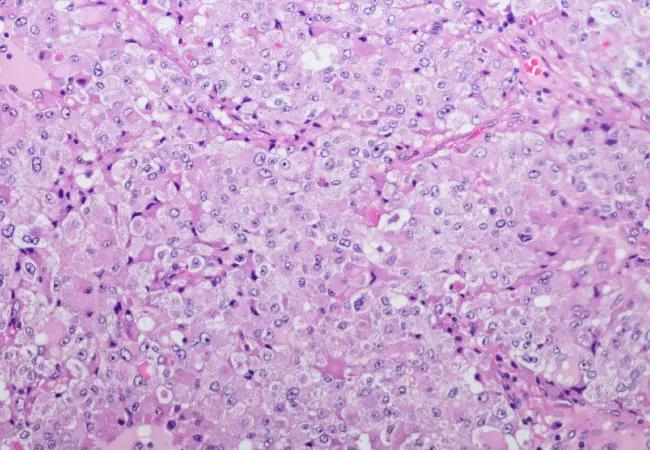Data from Phase 2 study of ONC201 to be presented at ASCO

Pheohromocytomas/paragangliomas (PC-PGs) are rare neuroendocrine tumors (NETs). While many cases are benign, metastases can occur and lead to poor outcomes. A new study led by Cleveland Clinic researchers suggests that the small molecule ONC201 has promise as a less toxic treatment for PC-PGs – and possibly other NETs as well.
Advertisement
Cleveland Clinic is a non-profit academic medical center. Advertising on our site helps support our mission. We do not endorse non-Cleveland Clinic products or services. Policy
Data from a small Phase 2 trial, to be presented at the 2021 American Society of Clinical Oncology meeting, show that weekly treatment with ONC201 was associated with tumor responses, particularly in patients with PC-PGs. Clinical benefits also were seen in patients with desmoplastic small round cell tumors (DSRCTs), rare sarcomas seen in adolescents and young adults for which prognosis is poor, even with multimodality therapy.
“We enrolled 10 patients with metastatic PC-PG and 12 patients with NETs in two cohorts. In about one-third of patients, once-weekly treatment with ONC201 stabilized disease,” says Principal Investigator Peter Anderson, MD, PhD, a pediatric oncologist at Cleveland Clinic Lerner College of Medicine. “One patient with DSRCT has been on ONC201 for more than two years, with minimal toxicity.”
The investigator-initiated, single-center trial (NCT03034200) enrolled 10 patients with PC-PG and 12 with other NETs. Participants received oral treatment with 625 mg of ONC201 once a week and were followed at six weeks, three months, and then every three months with computed tomography (CT) scans and tumor markers (plasma chromogranin and metanephrines).
“ONC201 is an imipridone with specificity for the dopamine-like DRD2 receptor and the mitochondrial protease ClpP, which exerts anti-cancer effects by upregulating TRAIL/DR5, inhibiting the dual AKT/ERK pathway and promoting an integrated stress response,” explains Dr. Anderson. “NETs secrete dopamine and harbor elevated DRD2 expression, and that is most pronounced in PC-PGs.”
Advertisement
The primary endpoint of the Phase 2 trial of ONC201 was response using MRI or CT. Response was defined as complete response (CR) + partial response (PR) + stable disease (SD) for >3 months by RECIST criteria assessed by the investigator. Secondary endpoints included progression-free survival, overall survival and safety. Patients in whom clinical benefit was seen were eligible for stereotactic body radiotherapy for non-indicator (e.g. bone) metastases.
Of the 10 patients with PC-PGs, five had PRs and two had SDs for more than three months. Median duration of therapy in that arm was nine months (range 1.5 to 33) and five patients took ONC201 for more than one year. In the arm with other NETs, one patient had a PR and two had SD for more than three months. Median duration of therapy was three months (range 1 to 33). There were no instances of dose modification or discontinuations due to treatment-related adverse events.
“It was gratifying, as an oncologist, to administer to patients with NETs a drug that had very little toxicity and some efficacy. ONC201 doesn’t make your hair fall out or your blood counts change. Patients on it have a very good quality of life and they are very willing to stay on ONC201,” says Dr. Anderson.
The next steps in Cleveland Clinic’s investigation of ONC201 are testing administration of the drug two days in a row rather than one day per week and exploring responses to the drug in patients with other types of tumors. “We’re very interested in opening up another arm for rare diseases such as adrenal carcinoma, cholangiocarcinoma, and other DRD2 expressing neuroendocrine cancers.”
Advertisement
A Phase 3 trial is further in the future because it requires randomization. According to Dr. Anderson, convincing patients to enroll is difficult when there is no gold-standard therapy that offers a clear benefit that can be used as a comparator. His advice to clinicians with patients who have NETs and might be interested in participating in receiving ONC201 on an investigational basis is to become a “known quantity” to Cleveland Clinic. That is, request an online consult or virtual visit with one of the experts at the Cleveland Clinic Lerner College of Medicine, who can then review the patient’s medical records and help advise on ways to maximize the individual’s health while awaiting an opportunity for clinical trial participation.
“We always want to do what is best for patients and not treat them as just clinical trial subjects,” Dr. Anderson says. “Online consults and virtual visits can actually help patients with rare diseases develop therapeutic alliances and serve as a real resource, whether they are able to come here for a clinical trial or not.”
Advertisement
Advertisement

Combining advanced imaging with targeted therapy in prostate cancer and neuroendocrine tumors

Early results show strong clinical benefit rates

The shifting role of cell therapy and steroids in the relapsed/refractory setting

Radiation therapy helped shrink hand nodules and improve functionality

Standard of care is linked to better outcomes, but disease recurrence and other risk factors often drive alternative approaches

Phase 1 study demonstrates immune response in three quarters of patients with triple-negative breast cancer

Multidisciplinary teams bring pathological and clinical expertise

Genetic variants exist irrespective of family history or other contributing factors